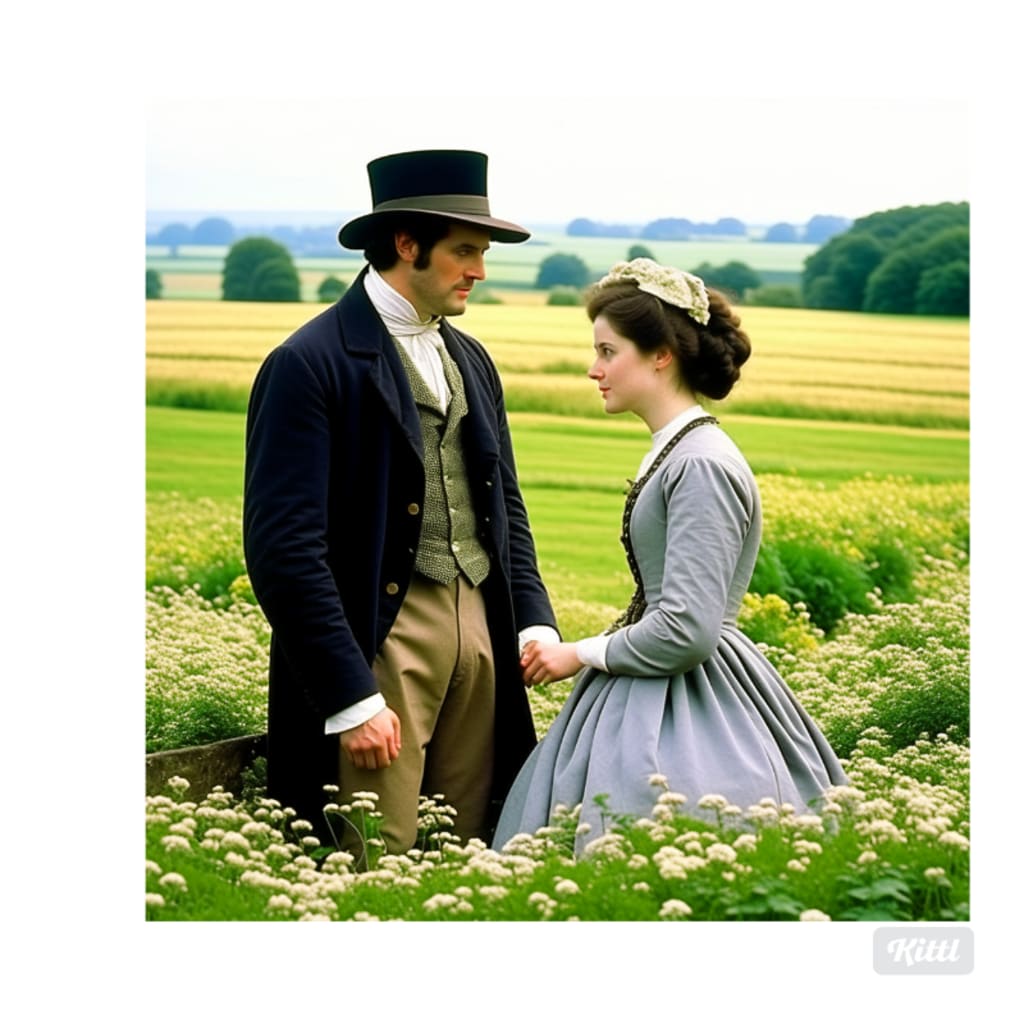The Best Romance Book/Novel: Pride and Prejudice by Jane Austin
The Triumph of Love over Prejudice

“Pride and Prejudice” by Jane Austin
Introduction:
One of the most cherished and timeless masterpieces of English literature is Jane Austen's "Pride and Prejudice," which was first published in 1813. The story, which is set in rural England in the early 1800s, examines issues of love, social status, reputation, and expectations from society. The intricate relationship between Mr. Fitzwilliam Darcy, a wealthy and dapper gentleman, and Elizabeth Bennet, a lively and intellectual young woman, is at the center of the narrative.
The Bennet Family:
The Bennet family—Mr. and Mrs. Bennet and their five children, Jane, Elizabeth, Mary, Catherine (Kitty), and Lydia—are introduced in the first chapter of the book. Given that the family land is entailed away from the female line and that the Bennet daughters must marry well to protect their futures, Mrs. Bennet is obsessed with finding her daughters acceptable husbands. However, Mr. Bennet is more realistic and sardonic, frequently finding humor in his wife's obsessions.
The Arrival of Mr. Bingley:
When Mr. Charles Bingley, a wealthy and well-mannered bachelor, rents the adjacent Netherfield Park, the plot picks up steam. His good friend Mr. Darcy, an affluent and yet distant guy, is going with him. Mrs. Bennet views this as a chance to give one of her daughters to Mr. Bingley for marriage. Mr. Bingley is drawn to Jane Bennet, his eldest and most attractive daughter, and the two fall in love right away.
Elizabeth’s First Impressions:
Elizabeth overhears Mr. Darcy decline to dance with her at the first neighborhood gathering, declaring her to be "tolerable, but not handsome enough to tempt him." Elizabeth takes offense at this remark and starts to think poorly of Mr. Darcy. In the meantime, despite his early misgivings about Elizabeth's social standing, Mr. Darcy grows more and more fascinated by her wit and brilliance.
The Complexities of Relationships:
The novel's intricate relationships are revealed to us as the plot develops. Mr. Bingley is fond of Jane because of her gentle and lovely disposition, but his sisters and Mr. Darcy plot to keep them apart since they think Jane does not feel the same intense passion for Bingley. Elizabeth's vivacious nature draws the interest of several potential suitors, among them the charming Mr. Collins, a clergyman and Bennet estate heir, who makes Elizabeth an offer but is quickly turned down.
Darcy's Growing Affection:
Mr. Darcy finds himself pulled more and more to Elizabeth's independence, wit, and intelligence despite his early misgivings. He finds her assertiveness and candor to be refreshing and fascinating, and he begins to respect these traits in her. But his sense of obligation and social status muddle his feelings for her.
Lydia’s Elopement:
When Lydia, the youngest Bennet daughter, elopes with Mr. Wickham, an attractive but dishonest officer, the storyline dramatically changes. The other girls' chances of getting married and the Bennet family's image are both at risk due to this scandal. Sensing the gravity of the situation and Elizabeth's distress, Mr. Darcy surreptitiously steps in to persuade Wickham to wed Lydia, thereby sparing the Bennet family from scandal.
Darcy’s First Proposal:
In the middle of Lydia's elopement, Mr. Darcy pops the question to Elizabeth. But his proposal offends Elizabeth and her family with its conceit and disdain. Elizabeth adamantly rejects him, citing his treatment of Wickham and meddling in the relationship between Jane and Bingley as justifications. Startled by her rejection, Darcy turns to leave, but the meeting makes him reconsider his actions and attitudes.
Elizabeth’s Reevaluation:
Following Darcy's proposal, Elizabeth starts to reconsider her emotions for him. She finds out about Darcy's true compassion and kindness—qualities he has concealed from society—from his maid. In the interim, she gets a letter from Darcy outlining his version of events including his interactions with Jane and Bingley as well as exposing Wickham's actual nature.
Darcy's Transformation:
Elizabeth begins to see Darcy in a different light as she learns more about his personality. Her shifting feelings are a result of Darcy's sincere care for his sister Georgiana, his devotion to his friends, and his morally righteous deeds for Lydia and Wickham. She comes to see that her early bias against him was unjustified and that, contrary to what she had previously thought, he is a lot more sophisticated and principled man.
The Reunion:
When Elizabeth and Darcy rejoin at Mr. Collins' house—who is now married to Elizabeth's acquaintance Charlotte Lucas—the narrative reaches a pivotal moment. Darcy is now more approachable and affable with Elizabeth, and his manner has softened. Elizabeth is careful about her increasing feelings for him, even though she is aware of their different social classes and her family's financial difficulties.
True Confessions and Happy Endings:
In the book's last chapters, misconceptions are resolved and genuine emotions are revealed. Once more, Darcy makes a sincere and modest proposal to Elizabeth, expressing his abiding love and admiration for her. Elizabeth accepts his proposal out of sheer emotion, and they tie the knot. At the book's end, a number of other characters—including Jane and Bingley—find happiness as well, and their previously tense relationships are patched up.
Conclusion:
"Pride and Prejudice" explores the intricacies of both societal standards and human character, going beyond a simple love narrative. Through Elizabeth Bennet and Mr. Darcy, Jane Austen delves into issues of self-discovery, maturation, and the significance of seeing past outward perceptions. The novel's ageless portrayal of love triumphing over social barriers and its praise of humor, intelligence, and character strength are what give it its ongoing appeal.
Centuries after its original publication, "Pride and Prejudice" continues to captivate readers and inspire adaptations, films, and conversations about love and relationships due to Austen's astute observations of society, sharp wit, and ability to create multidimensional characters.
Get access to this book for 100% free.
Some link in this article might pay commision.
About the Creator
Michelle Mirabelli
Hello everyone! Michelle here. I'm passionate about understanding the intricate details of life. I hope the knowledge I convey to you serves as a lighthouse, illuminating your path while providing enjoyment as you traverse this life.






Comments
Michelle Mirabelli is not accepting comments at the moment
Want to show your support? Send them a one-off tip.